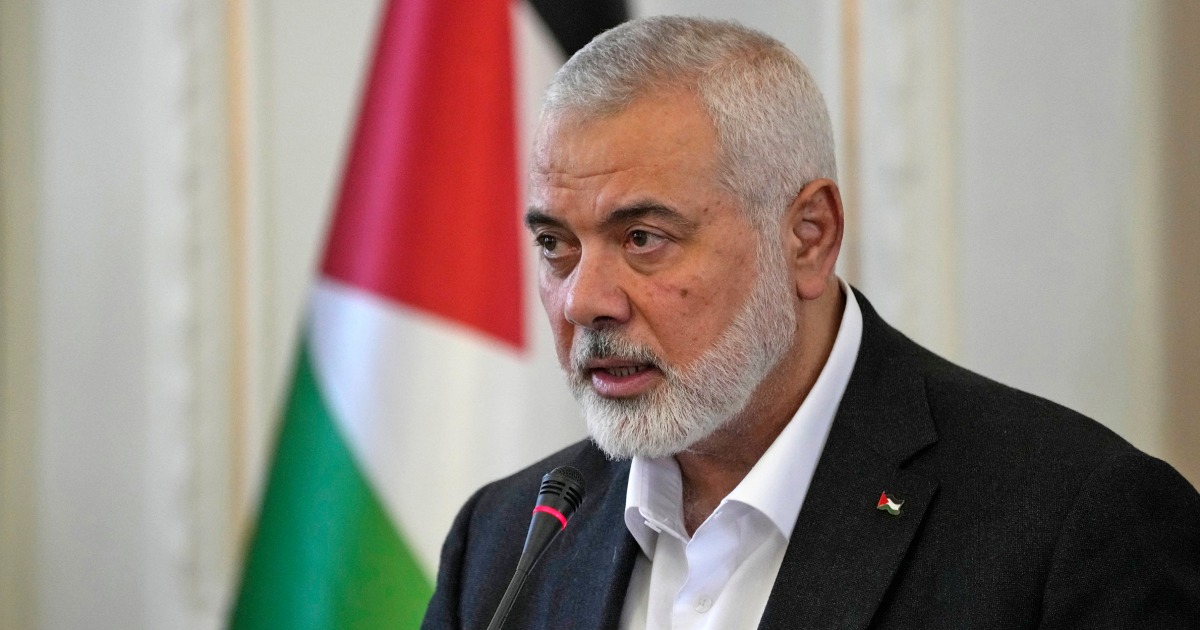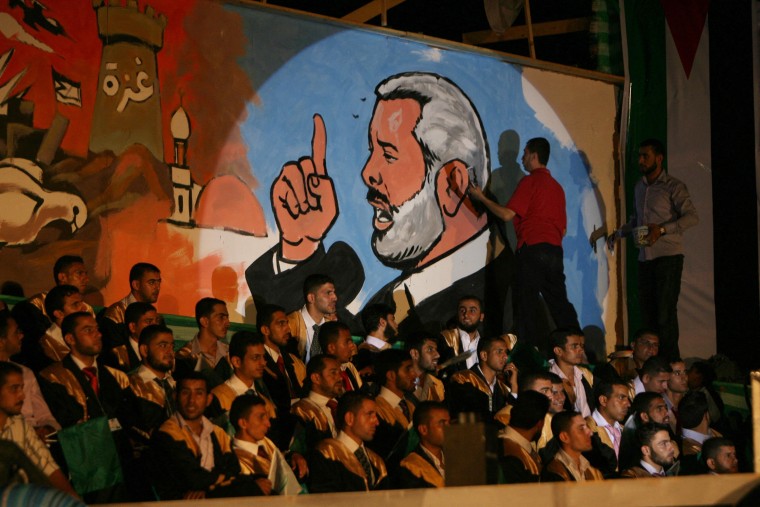World
Hamas political leader Ismail Haniyeh killed in Iran, group says

Hamas’ political chief, Ismail Haniyeh, was killed early Wednesday in the Iranian capital, according to Iran and the Palestinian militant group, both of which blamed Israel for an attack that has raised fears of spiraling conflict in the region.
Haniyeh, 62, was assassinated in Tehran after he attended the inauguration ceremony for Iranian President Masoud Pezeshkian, Hamas said.
Haniyeh, who “died as a result of a treacherous Zionist raid on his residence in Tehran,” according to a Hamas statement on Telegram, was also a senior negotiator in cease-fire talks with Israel. So his death could imperil negotiations aimed at ending the war in the Gaza Strip and ensuring the return of hostages held in the enclave.
Iran’s Islamic Revolutionary Guard Corps confirmed that Haniyeh and one of his bodyguards had been killed in a strike on their residence and said it was investigating, Iranian state media reported. The residence was “struck by an air-launched guided projectile” at around 2 a.m. local time Wednesday (6:30 p.m. ET Tuesday), state media said.
Pezeshkian, a reformist who had promised to reach out to the West, said Iran would “defend its territorial integrity, honor, dignity and pride” and make the attackers “regret their cowardly action.”In a statement, Ayatollah Ali Khamenei, Iran’s supreme leader, said Israel had “set the stage for severe punishment for itself.”
The Iranian Parliament’s national security committee was expected to hold an emergency meeting about the strike later Wednesday.
There was no immediate comment from Israeli authorities, who had vowed to kill Haniyeh and other Hamas officials after the group’s Oct. 7 terrorist attack on Israel. But Haniyeh’s death was welcomed by senior Israeli government official Amihai Eliyahu, who said in a post on X that it “makes the world a little better.”
Secretary of State Antony Blinken said the U.S. was “not aware of or involved in,” the strike. Speaking with Channel News Asia in Singapore, Blinken said it was “imperative” to get a cease-fire in Gaza. He added that it was “vitally important” to help Palestinians in Gaza and “to get all hostages home including a number of Americans.”
Defense Secretary Lloyd Austin, who is visiting the Philippines, told reporters he didn’t “think that war is inevitable” and he maintained that “there’s always room and opportunity for diplomacy.”
The hunt for Hamas’ leadership has been ongoing since the group’s Oct. 7 terror attack from the neighboring Gaza Strip, which killed 1,200 people and resulted in the kidnappings of about 250 others, according to Israeli officials. In April, three of Haniyeh’s sons were killed in an airstrike in the Palestinian enclave.
Wednesday’s attack on Haniyeh builds on a yearslong proxy war between Iran and Israel and comes at a delicate time for the region amid concerns that the Israel-Hamas war will spread beyond Gaza. The conflict has already drawn in other militant groups backed by Iran, such as the Lebanon-based Hezbollah, which has been attacking Israel from the north, and Yemen’s Houthi rebels, who have been attacking ships in the Red Sea.
Haniyeh had made announcements about the progress of cease-fire agreements in the past, and it is unclear how his death might affect efforts to pause the fighting in Gaza, where health officials say almost 40,000 Palestinians have been killed, and secure the release of hostages still held by Hamas.
The strike came a day after the Israeli military said it had killed a Hezbollah leader, Fuad Shukr, in a suburb of Beirut, the capital of Lebanon, that is known to be the home of Hezbollah’s headquarters. The group said Wednesday that Shukr had been in the building at the time and that it was still searching the rubble for victims.
The Israel Defense Forces said Shukr was the commander responsible for an attack last week in the Israeli-controlled Golan Heights that killed 12 people, mostly children and teenagers.
The Israeli military said Wednesday that it was conducting a situational assessment but had not changed the defensive guidelines for civilians. Prime Minister Benjamin Netanyahu was expected to hold a security assessment meeting with senior defense officials later in the day.
Haniyeh’s killing was condemned by officials from Hamas and other militant groups.

“Assassinating Ismail Haniyeh is a cowardly act and will not go unpunished,” Hamas official Moussa Abu Marzouk said on Al Arabiya TV.The attack on Haniyeh was also denounced by senior Palestinian official Hussein al-Sheikh, who said in a post on X, “this pushes us to remain more steadfast in the face of the occupation, and the necessity of achieving the unity of the Palestinian forces and factions.”
The foreign ministries of Turkey and Qatar, both countries where Haniyeh had spent time while living in exile, described his killing as a “heinous” attack and said it raised the risk of wider conflict in the region. China and Russia also condemned the attack.
Haniyeh left Gaza when he was named Hamas’ top political leader in 2017. His successor as Hamas’ leader in Gaza, Yahya Sinwar, remains at large in the enclave. Sinwar has been described as a “dead man walking” by Israel’s military and is considered to be the mastermind of the Oct. 7 attack.
Though Israel has not confirmed responsibility for Haniyeh’s death, it is likely to further escalate tensions with Iran, which sent hundreds of rockets and drones toward Israel in April in retaliation for an airstrike on its embassy in Damascus, Syria, that killed two of its top commanders.
Although the rockets were intercepted by Israel, the attack was the first direct one between the two countries. Iran, which does not officially recognize Israel’s existence, said at the time that the West should be grateful for its “restraint.”










